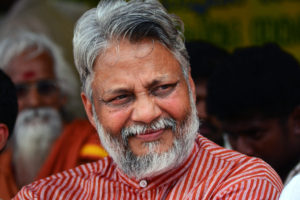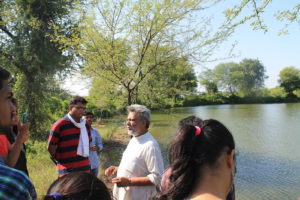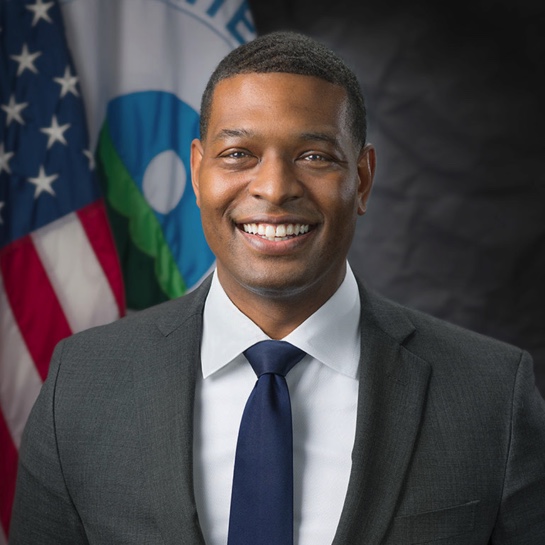The Avari River, in the northwestern Indian state of Rajasthan, had not flowed for 60 years. When a young doctor arrived to help local communities, they told him what they needed wasn’t doctoring, but water. Rajendra Singh listened, and today the Avari River flows again, thanks to the “Waterman of India.”
Rajendra Singh was born on August 6, 1959, in the Uttar Pradesh region of India, just east of Rajastan. He was a fortunate child, born into a landowning class and also a class that had responsibility for the community around him. As a student, he learned “how to respect communities, democratic values, the poorest of the poor.”

Those lessons stuck with him when, as a 28-year-old, he gave up a comfortable government job to work for the benefit of the poor. “You have only one heart and one mind,” he said, “When you work in government service, you use neither.” He traveled to a small village in Rajastan, called a “dark zone” by the Indian government because of its lack of water.
Singh learned about the ancient practice of building small dams, called johads, on rivers to store water during the rainy season. He began to build johads on the Avari River, starting at the upper end of the river. “It was hard work,” he said, “We labored for 10-14 hours a day. When the rains came, our water bodies filled up.” With community support, he kept building more dams, supplying needed water to village after village. When they had built 375 johads, the river began to flow again. By 1995, the Avari River became perennial again, flowing with water all year long.
Over the next 20 years, Singh and his colleagues kept working. They have built more than 8600 johads and brought water back to 1000 villages throughout Rajastan. As a result, forests have begun to re-generate and wildlife is returning.

The real success, Singh insists, is that they “managed to involve the community. Alone, we can do nothing.” He has developed community-based practices for making decisions and getting work done. A River Parliament, composed of elders elected by riverside villages, makes decisions about managing the Avari River, including distribution of water among villages and users.
Singh is known as the “Waterman of India” for his work. He was awarded the Ramon Magsaysay Award, Asia’s highest honor, in 2001 for his community-based approach to water development. In 2015, he was awarded the Stockholm Water Prize, considered the Nobel Prize for water. In accepting the award, Singh said:
“When we started our work, we were only looking at the drinking water crisis and how to solve that. Today our aim is higher. This is the 21st century. This is the century of exploitation, pollution and encroachment. To stop all this, to convert the war on water into peace, that is my life’s goal.”
Today, it seems, Singh vacillates between optimism and pessimism about the future of water. He believes strongly in the success of local, small-scale efforts, but he holds grave concerns about large-scale programs. Mining of groundwater, especially for crop irrigation, “is a sin.” Large dams, he believes, have created both more drought and flooding, rather than solving those problems:
“In the 70 years since independence, more than 10 times more land is under drought and eight times more land is under flood. I have seen people in some of these villages being displaced three, four, eight times. This is not really development. These dams are damned.”
Rajendra Singh, regardless of his emotions at any time, remains the ultimate “waterman.” He says, “Water is my life, my happiness, my teacher.” May we all feel the same.
References:
Ganguly, Amit. 2017. Q&A: “Waterman” Rajendra Singh loses hope as India runs out of groundwater. Reuters, September 7, 2017. Available at: https://www.reuters.com/article/india-water-crisis/qa-waterman-rajendra-singh-loses-hope-as-india-runs-out-of-groundwater-idUSKCN1BI0QX. Accessed June 6, 2018.
Ramon Magsaysay Award Foundation. 2001. Singh, Rajendra, Community Leadership, India, 2001. Available at: http://rmaward.asia/awardees/singh-rajendra/. Accessed June 6, 2018.
Stockholm International Water Institute. 2015. Rajendra Singh – The water man of India wins 2015 Stockholm Water Prize. Available at: http://www.siwi.org/prizes/stockholmwaterprize/laureates/2015-2/. Accessed June 6, 2018.
Zachariah, Preeti. 2017. “Water is my life, my happiness, my teacher.” The Hindu, June 10, 2017. Available at: http://www.thehindu.com/society/water-is-my-life-my-happiness-my-teacher/article18921839.ece. Accessed June 6, 2018.

